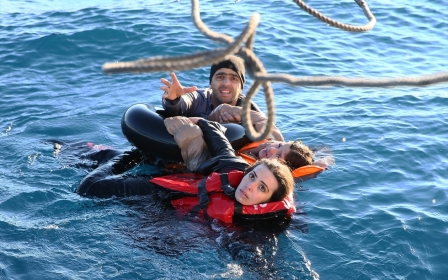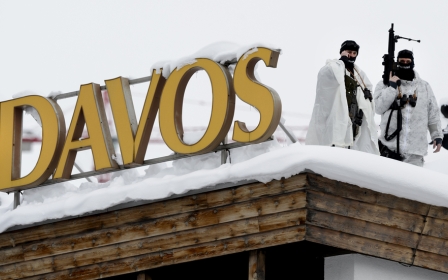Refugees are not destabilising Europe. Europe is destabilising them

Another two boats sank in the Mediterranean on Friday, with more than 40 people reported drowned as they tried to reach Greek islands and the supposed safety of Europe.
This week the world's richest bankers, politicians and businessmen met in the Swiss mountain resort of Davos for their annual gathering, their words dutifully reported by a bedazzled media. It became the occasion for politicians to spell out their unease about the refugee crisis. It was not a pretty sight.
French Prime Minister Manuel Valls declared that Europe was in danger of becoming "totally destabilised" if refugees from the Middle East and South Asia were allowed into Europe.
According to Valls, the concept of Europe was now in grave danger. He echoed Dutch Prime Minister Mark Rutte, who also used the super-rich jamboree at Davos as the setting to announce that Europe's Schengen Agreement, which allows free movement across most of the continent's national borders, would be dead in two months if something was not done to stem the influx of refugees.
Meanwhile, a new law in Denmark will continue its draconian policy towards refugees, driven by the strength of the far right, by confiscating property, including jewellery of refugees. In a touching move, wedding rings will now be exempted lest the parallels with the treatment of Jews in 1930s Nazi Germany seem too uncomfortably close.
Post-war Europe drew up laws and agreements in the hope of preventing such savagery and cost to human life happening again. Politicians now appear willing to tear them up to deny refuge to some of the most desperate people in the world.
We see attacks on people from the Middle East and North Africa, on Muslims in general, and increasingly on refugees themselves. These attacks are all too often driven by the far-right, but are echoed by mainstream politicians like Valls and Rutte, and find respectability as they are taken up by the vast majority of the media, including the liberal press.
Refugees are, according to these views, a major problem in Europe. In reality, it is the other way round. It is European countries that have waged successive wars across the Middle East and South Asia; it is European countries that have provided arms to the region and whose aid often comes in the form of military infrastructure; it is European countries that have developed a culture of racism which means that non-Europeans who come to live and work in Europe are treated as second-class citizens, denied decent jobs, housing and opportunities.
It is from Europe too that colonialism spread to large parts of Asia and Africa from the 19th century onwards, and whose legacy still lingers as the former colonial powers still intervene militarily and economically in those countries.
There are a number of inescapable facts about the present refugee crisis. One is that it derives from wars, wars which for the most part have involved countries such as Britain and France. Refugees are coming from Syria where a number of powers are involved, and from Afghanistan, Iraq and Libya, all of which have been bombed, invaded or occupied by the Western powers in the past 15 years. The refugee crisis is the product of these wars.
Everyone should have the right to escape wars and those in the richest countries have an obligation to help them. But such obligations are being torn up by governments under the auspices of an EU which preaches freedom of movement but which is discriminating on racial and national grounds.
It also highlights the inequality within the world. In the week of Davos, Oxfam announced that the world's richest 62 billionaires had wealth equivalent to half the world's population. Such inequality not only makes a mockery of any genuine democracy, since it means that politicians are increasingly in hock to the Murdochs and the Trumps, but it denies the vast majority of the world access to the basic necessities of life.
Perhaps the most pernicious aspects of the refugee crisis is the way in which it highlights racism at every level of society, and how decent treatment of refugees is being driven off the political agenda as right-wing parties and governments demand even more draconian measures.
The relative generosity of countries such as Germany and Sweden compared with the mean and racist attitudes of, for example, Britain, is now being pilloried as tougher measures are demanded everywhere.
Countries such as Slovakia and Hungary use openly Islamophobic policies over refugees, such as the demand for only Christian refugees. British Prime Minister David Cameron has echoed Islamophobic sentiments with his claim that Britain is a Christian country and the demand that Muslim women in particular are singled out as having to learn English.
The wars launched in the past decade did incalculable damage to the countries concerned, with millions of people killed, injured or made refugees. The vast majority of the latter come nowhere near Europe, but are often in camps in neighbouring countries. European leaders have made it clear that they would rather pay countries like Turkey or Jordan to keep them there.
But the wars also dealt a blow to politics in Europe: they have been accompanied by a rise in racism against Muslims, much of it now focused on the refugees.
As the world economy faces another slowdown, and perhaps worse, the triple factors of war, austerity and racism are coming together in a way not seen since the 1930s. That is the problem facing Europe, not the plight of refugees whose only crime has been to suffer years of war.
- Lindsey German is convenor of the Stop the War Coalition and co-author of A People's History of London
The views expressed in this article belong to the author and do not necessarily reflect the editorial policy of Middle East Eye.
Middle East Eye propose une couverture et une analyse indépendantes et incomparables du Moyen-Orient, de l’Afrique du Nord et d’autres régions du monde. Pour en savoir plus sur la reprise de ce contenu et les frais qui s’appliquent, veuillez remplir ce formulaire [en anglais]. Pour en savoir plus sur MEE, cliquez ici [en anglais].





